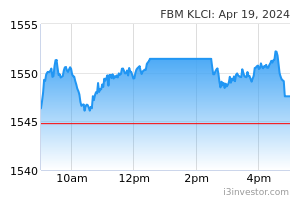Ministry wants to minimise bureaucracy to propel SME growth

KUALA LUMPUR (Jan 10): The Ministry of Entrepreneur Development (MED) is trying to minimise bureaucracy involving the development of Small and Medium Enterprises (SME) so as to enable them to contribute about 41 percent to the country's Gross Domestic Product (GDP) this year.
Minister Datuk Seri Mohd Redzuan Yusof said this was among the major challenges of the Ministry in line with the policy outlined in the National Entrepreneurship Policy 2030 (DKN2030).
“The bureaucratic process should be re-evaluated and improved. There were many complaints from the SME on the issue, about the delay in this, delay in that. We are addressing this right now as we move into the second year of Pakatan Harapan (PH) government,” he told Bernama at his Ministry here.
He said if the issue of bureaucracy could be well addressed, the year 2020 will be the best year to prove Malaysia’s capability in weathering the uncertain global economic wave.
Optimistically, the Minister said the MED had also lined up various programmes and training for SME entrepreneurs, including basic entrepreneurship course, to face the fourth industrial revolution (IR4.0).
“Training and awareness towards the IR4.0 should be stepped up because many of our entrepreneurs are still reluctant to migrate to digital technology,” he said.
Mohd Redzuan also expressed confidence that the Government is on the right track to creating 250,000 entrepreneurs and one million employment opportunities in Malaysia in five years in line with PH government's manifesto.
“Based on the data we collected in 2018-2019, we have already created more than 50,000 new entrepreneurs, so I am confident that, with the cooperation of all agencies and Ministries, we can achieve the target of creating 250,000 new entrepreneurs.
“Besides, our country is very fortunate as we have a ‘goldmine’ in the agricultural sector which can be capitalised as we are spending more than RM50 billion on imported food products,” he said.
Meanwhile, the Ministry's 2019 report card stated that 20 new fertigation entrepreneurs were created among the B-40 group, youths, women and persons with disabilities (OKU), each earning an income of more than RM4,000 a month, last year.
In terms of funding, as at November 2019, RM394.86 million TEKUN Nasional financing was approved involving 19,087 B40 entrepreneurs. Apart from that, 1,187 entrepreneur talents were being developed under the Innovation Driven Enterprise programme, as well as 30 social enterprises under the B40 Easy Fund organised by MED and the Ministry of Finance.
There were also 2,184 graduates placed at 124 companies (101 private companies and 23 GLCs) via the Professional Training and Education for Growing Entrepreneurs programme (Protégé) to enhance their entrepreneurial skills and marketability, while the Bumiputra Youth Entrepreneurship (TUBE) 6.0 programme has been extended to B40, poor, OKU and rural areas to empower Bumiputra contractors.
The Contractors Trust Fund Scheme (SKWAK) fund management programme was revived under the MED from Sept 1, 2019, with 46,951 of Grade G1-G7 contractors obtained the Bumiputera Status Certificates and 2,089 others obtained the Bumiputera STB Grade G1 status.
A total of 215 courses on basic, technical and management skills were also held to benefit 6,450 Bumiputera contractors.
The ScoreXcess programme introduced on Sept 30, 2019, has functioned as a one-stop portal for micro and small-scale entrepreneurs to access such financing.
The programme was developed jointly between Centre for Entrepreneur Development and Research (CEDAR), SME Bank, Orion IXL and Telekom Malaysia and among the funding agencies involved in the programme are Bank Rakyat, Perbadanan Usahawan Nasional Berhad (PUNB) and Perbadanan Nasional Berhad (PNS).
As of Dec 18, 2019, a total of 493 applications were received with funding worth almost RM3 million.
Not forgetting the development of MalaysiaBiz through the collaboration between the SME Corp and the Malaysian Administrative Modernisation and Management Planning Unit (MAMPU) which provide business registration and licensing information for 2,919 types of licences from 508 licensing authorities covering 1,174 business activities.
As of December 2019, the portal has recorded 110,134 visitors and 36 transactions.
( 24,36 % )
( 39,38 % )
( 36,26 % )


